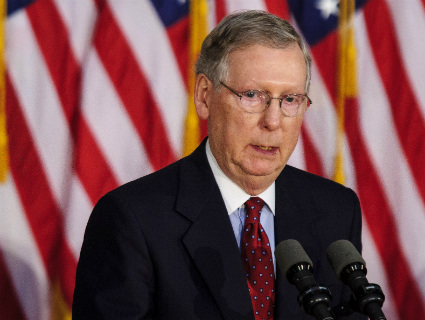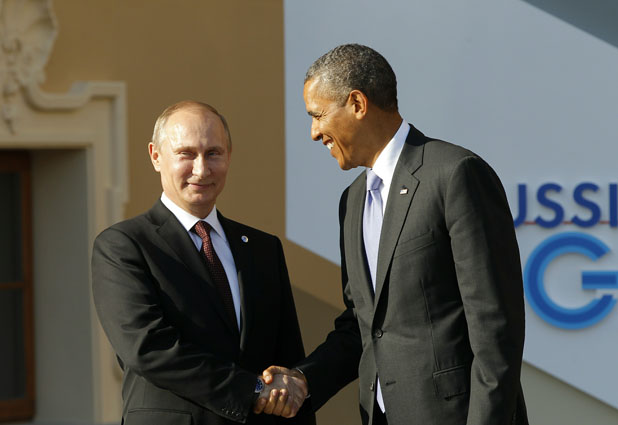
Senate Minority Leader Mitch McConnell.<a href="http://www.flickr.com/photos/gageskidmore/8567879140/sizes/m/in/photolist-e47BY9-dCrDwN-dCtLqK-dCzcvf-71C33c-7Gei5H-6ptYBN-8TTXLg-81Cx4n-cE7HVd-cE7J51-82ZqwX-82ZpbP-82Zrii-7TKNP1-6pFjZj-cE7KbA-cE7JZL-cE7L6f-cE7Ji3-cE7Kkm-cE7KWq-cE7Lew-e41YUR-e47zLY-e47BEd-e41YKt-e47APW-e47BPA-e47Ag3-e47Bvw-e47zrL-e47z3j-e41Ygk-e47AZQ-e47zd7-e41Wmc-e47zjG-e47A67-e47zAG-e47zX1-e47Ax5-77yJbL-6anwzb/">Photographer</a>/Flickr
At an appearance Friday at the Northern Kentucky Chamber of Commerce, Senate Minority Leader Mitch McConnell (R-Ky.) spoke about the Syrian civil war and the Assad regime’s use of chemical weapons on the Syrian people.
McConnell did not take a position on whether the US military should bomb Syria in response to the chemical weapons attacks. “This is a tough call. I think there are good arguments on both sides,” he said. The Kentucky senator told the audience he would announce his position on whether to bomb Syria next week.
McConnell did, however, delve a bit deeper into his views on the chemical weapons attack. “Use of chemical weapons against anybody, particularly against your own people, has been viewed for decades as simply unacceptable,” he said. That view is awfully close to President Obama’s position that the use of chemical weapons crosses a “red line” widely acknowledged by the international community.
In 2012, Obama said that “a red line for us is we start seeing a whole bunch of chemical weapons moving around or being utilized. That would change my calculus.” Earlier this week, Obama hedged that by saying, “I didn’t set a red line; the world set a red line. The world set a red line when governments representing 98 percent of the world’s population said the use of chemical weapons are abhorrent and passed a treaty forbidding their use even when countries are engaged in war.”
What McConnell said at the Northern Kentucky Chamber is a boiled-down version of that statement. It remains a mystery whether McConnell will back strikes in Syria—and risk further inflaming his already hostile conservative base—or cast his lot with fellow Kentucky senator Rand Paul and oppose the strikes. We’ll have to wait until next week to find out.













